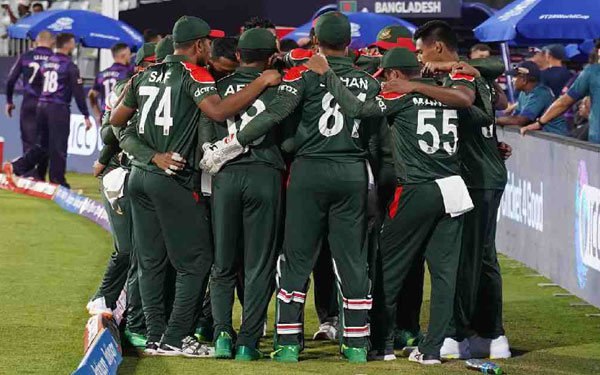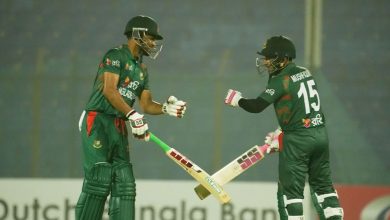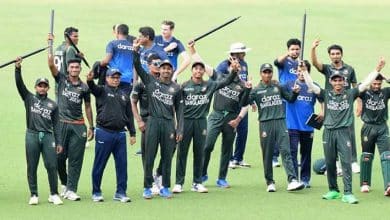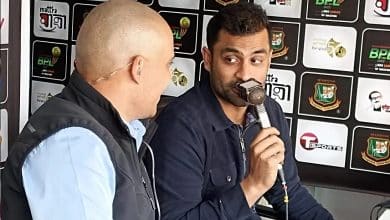Tigers seek redemption in T20 series against Afghanistan

Bangladesh are eying to make a winning start in the two-match T20 series against Afghanistan, when they take on the visitors today (Thursday) at Sher-e-Bangla National Cricket Stadium.
The match which starts at 3 PM will be aired live on Gazi TV and T Sports Channel.
The Tigers know that a winning start against Afghanistan in T20 series will be the toughest job for them despite winning the three-match ODI series by 2-1. While the defeat at the last ODI match ruined their momentum to some extent, their track record against Afghanistan in this format also dismal one.
Of the six encounters against this opponent, Bangladesh won just two and lost four matches, including being whitewashed in a three-match series in Hyderabad, India, the Afghans adopted venue in 2018.
Last time the two teams met in this format in a tri-nation series that also included Zimbabwe in Bangladesh in 2019. Afghanistan in that double-leg series beat Bangladesh by 25 runs at Sher-e-Bangla National Cricket Stadium but conceded a four-wicket defeat at Zahur Ahmed Chowdhury Stadium in Chattogram. The two teams moved to the final but the match was washed out and they are declared joint-winner.
As per the stat, Bangladesh though won the last match in this format but at Mirpur venue, Afghanistan won their last match.
Bangladesh beat teams like Australia and Zimbabwe at Mirpur but at this same venue, there were whitewashed at the hands of Pakistan in their last series in November last year.
The stat proved Asian opponents have always an edge over Bangladesh in Mirpur venue.
Bangladesh though played the ODI series in Chattogram, risked to play the T20 series in Mirpur, largely due to seek an improvement in this format with T20 World Cup in Australia later this year in mind.
The Tigers particularly want to improve their first powerplay record in T20 cricket, which is the arena where they time and again proved them to be vulnerable. Bangladesh T20 captain Mahmudullah Riyad said, this time they
will go into the game with a mindset of making at least 40/45 runs in the first six overs.
“It’s the arena where we should improve our game. We know a T20 World Cup is coming up and if we can’t improve in this arena, we’ll fall in deep problem. So the target is to score at least 40/45 runs in the first powerplay,” Mahmudullah said here on Wednesday.
Having said that he indicated, Munim Shahriar, an uncapped player is highly likely to make his debut given his ability to play shots from the first ball in the first powerplay.
Shahriar may not hit a big score but his boldness to play his shot in the last Dhaka Premier League T20 and BPL T20 proved him a player Bangladesh are searching for in this format. He scored runs at 152 strike rate in BPL and gave his side Fortune Barishal always a whirlwind start in the first powerplay.
“He has a good chance to make his debut tomorrow,” Mahmudullah said, adding that Shahriar has the ability to go after bowlers fearlessly right from the start.
For Bangladesh, what is bad news is that their old nemesis Rashid Khan regained his form as he claimed 3-37 to script side victory in the third and final ODI. His three-wicket haul came in a pace-friendly wicket, which Bangladesh prepared to neutralize the effect of Rashid and other spinner of Afghanistan.
Since Mirpur wicket is traditionally slow and low, Rashid and his partner Mujeeb Ur Rahman and Mohammad Nabi may get this wicket to their extremely likings.
But as Mahmudullah said, Bangladesh will play fearless cricket to make statement in this format.
The Tigers so far played 123 matches in this format. They won 43 and lost 78 while two matches fetched no result.
Squad
Bangladesh: Mahmudullah Riyad (Captain), Liton Kumer Das, Munim Shahriar, Shakib Al Hasan, Mushfiqur Rahim, Afif Hossain, Mahedi Hasan, Yasir Ali Chowdhury, Mustafizur Rahman, Taskin Ahmed, Shoriful Islam, Nasum Ahmed, Shohidul Islam, Naim Sheikh.
Afghanistan: Rahmanullah Gurbaz, Hazratullah Zazai, Usman Ghani, Darwish Rasooli, Mohammad Nabi (c), Najib Zadran, Afsar Zazai, Karim Janat, Azmatullah Omarzai, Sharafuddin Ashraf, Rashid Khan, Mujeeb Ur Rahman, Qais Ahmad, Fazal Haq Farooqi, Nijat Masood, Fareed Ahmad Mailk.





